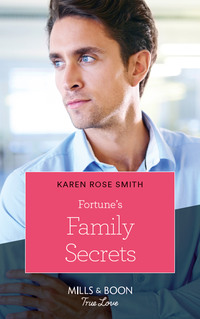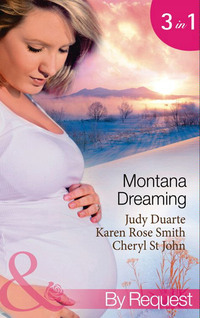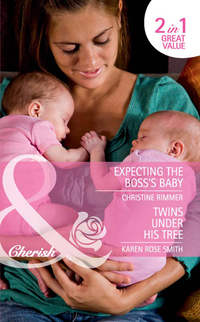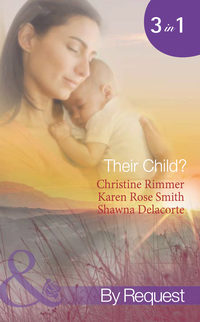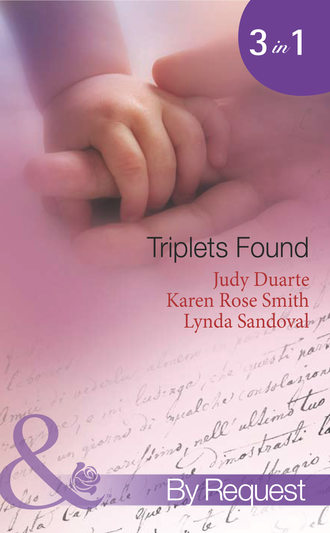
Полная версия
Triplets Found: The Virgin's Makeover / Take a Chance on Me / And Then There Were Three
“No, it’s just ahead. And you really can’t park any closer than this. See the little suspension bridge that leads to the big house?”
“Yes.”
She pointed beyond the wooden structure that spanned the fishpond, toward the quaint guest house she’d always thought of as a cottage. “It’s just across the lawn.”
They stopped long enough for Sullivan to retrieve a suitcase from the trunk of a sporty, silver-gray Mercedes and for her to snap a leash on Barney.
“Lead the way,” Sullivan said, with that flirtatious grin that made her heart rate go bonkers.
Was it her imagination? Or did he keep sliding a glance her way?
No way. It had to be her imagination. Maybe he found her an oddity. Or a novelty of some kind. That had to be it, because she never harbored any unrealistic expectations when it came to men.
“It’s nice out here,” he said, scanning the lush lawns that surrounded the house.
“I can’t imagine living anywhere else.” And she couldn’t. Living on the vineyard, being a part of the land, was one of the best things about being adopted by the Cartwrights. Their love, of course, was another. Even if Lissa didn’t quite fit in, she never doubted their affection.
As they reached the wood-planked front porch of the guest house, she turned the antique brass knob and opened the door. “It’s not much, but it’s cozy.”
Actually, Lissa thought the little house was pretty special. She and her mom had decorated it in a country French decor, with café-style window coverings, a blue plaid sofa and a coordinating floral, overstuffed easy chair.
“It gets pretty chilly at night.” She pointed to the thermostat on the light-oak-paneled wall. “You can adjust the heat to your comfort.”
He nodded toward the stone hearth that boasted a stack of firewood, kindling and matches. “I’d rather have a fire.”
So would Lissa, if she were staying in the cottage. A fire was cozier. And more romantic.
Darn it. Those blasted romance books were getting to her again. And the sooner she could box them up and chuck them into a blazing fire, the better off she’d be.
“There’s a kitchenette,” she said, “in case you prefer to take your meals alone. But knowing my mom, she’ll insist that you join us.”
“I eat most of my meals in restaurants, so I’ll be looking forward to some home cooking.”
“Well, good. Mom will be pleased.” Lissa would be, too, but she battled the girlish rush of excitement. “I’ll show you the rest of the place.”
As she entered the hallway and glanced through the open doorway to the bedroom, her gaze landed upon the blue-and-white checkered comforter on the double bed she’d made up yesterday.
She caught a whiff of his musky, highland scent—mountain fresh and wild—and felt his presence close in on her, as though she might find him inches away, if she turned around.
Her pulse and her breathing seemed to escalate, but her feet remained rooted to the spot.
“Nice room,” he said.
Unable to help herself, she turned and caught him merely inches away.
Watching her.
And he wasn’t smiling—at least, not in a teasing sort of way.
Something passed between them, although she wasn’t sure what it was. Could it be sexual awareness?
Nah. Impossible. Not on his part, anyway.
She cleared her throat, which seemed to be another habit she’d mysteriously acquired today. “The bathroom is down the hall, next to the linen closet. The cupboards and shelves are stocked, so you should find everything you need.”
“Thank you.” His voice wrapped around her like a tartan plaid on a winter night.
Oh, brother. Those books were going right into a moving trash truck the first chance she got.
“Well,” she said, trying to ignore the rush of sexual awareness she didn’t know how to deal with. “I guess I’ll leave and let you get unpacked.”
“Don’t,” he said.
Huh? “Don’t what?”
“Don’t leave yet.” He tossed her a boyish grin. “I spotted a bottle of wine on the kitchen counter.”
“It’s our sauvignon blanc. I thought you might like to have a glass now and then.”
“That sounds good now. Will you join me? On the front porch?”
The offer took her aback. But it also excited her.
She tried desperately to tell herself it was a continuation of business. A way of relaxing over drinks. The kind of things businessmen did all the time.
Yet she couldn’t help making just a wee bit more out of the invitation than was probably wise for someone with a virgin heart—just ripe for the picking.
And ready to bruise.
Chapter Two
The wooden deck in front of the cottage overlooked the main house, as well as the fertile vineyard.
Sitting at a glass-topped, wrought-iron table, Sullivan and Lissa enjoyed a stunning view as they shared a glass of wine and watched the sun sink low into the western sky.
“Your sister doesn’t look anything like you,” Sullivan said by way of small talk. He’d noticed how much Eileen and her mother had resembled each other when they’d brought lunch down to the office.
In fact, Lissa didn’t look much like her father, either. Ken Cartwright was short and stocky, with a receding blond hairline and a ruddy complexion. He wasn’t much to look at, but he was a hell of a nice guy.
Lissa fingered the stem of her wineglass, as though his comment might have bothered her. And he was sorry he’d brought it up. If he could, he’d reel in the thoughtless words.
She looked up and caught his eye. “I don’t look like my family because I’m adopted.”
Whoops. He hadn’t meant to get so personal. And he wasn’t sure how to make up for the klutzy attempt at conversation, so he merely nodded and said, “You’ve got a nice family.”
“Yes, I do.” She took a sip of wine. “Do you have any brothers or sisters?”
“Nope. I’m an only child.”
“That sounds like it might have been sad growing up.”
He shrugged. His childhood had been pretty crappy, but not because he didn’t have siblings. “I had a lot of cousins to play with.”
“Tell me about your family,” she said, settling into the chitchat.
Sullivan rarely talked about himself. Nor about personal matters. But maybe because he’d accidentally prodded the adoption revelation out of her, he felt as though turnaround was fair play.
“My folks both loved me, I guess. But their relationship was stormy, and their marriage ended in divorce before I hit middle school.”
“That’s too bad.”
It was. From an early age, Sullivan had dreamed of belonging to a stable family. Maybe that’s why he’d married so early. He’d been ready for kids, picket fences and family vacations. But his wife had refused to consider having his baby, then had left him for another man.
Her leaving had not only dashed his unrealistic dreams and damaged his heart, but it had been a real eye-opening experience. She’d taught him a simple lesson. Sullivan wasn’t, and maybe never had been, destined for family life.
“It was no big deal,” he lied. “Some people shouldn’t ever get married.”
“What kind of people?”
Her eyes held a naïveté that surprised him, but he smiled and filled in the blanks as generically as he could. “The kind of people who make promises they don’t keep.”
His parents’ marital nightmare had been brutal for a kid to endure. And his own divorce—six years ago—had been pretty tough.
But hey. He’d bounced back quickly.
His first effort to rebound was by having a few relationships, mostly with shallow socialites who would never tempt him to put his heart on the line again. And it had helped. A lot.
“Funny thing about my folks,” he said, wanting to focus his thoughts on his parents’ divorce and not his own. “My father’s family had money and status. And they could trace their lineage back to the Mayflower. But that never seemed to be good enough for my mom.”
“Why not?”
He would have shrugged off her question, tried to avoid getting into a conversation that was too deep, one that reminded him of his own failed marriage and was too damn revealing. But for some reason, he cut to the chase. “Some women want more than some men can provide.”
She furrowed her brow, but didn’t respond. And he wondered whether she had any idea what he was talking about.
Probably not. But that was as far as it would go.
It was bad enough that Sullivan had to relive history in his mind. He didn’t need to open himself up to memories best left forgotten.
Lissa wasn’t sure what Sullivan meant. And maybe she should ask. But the fact was, they had nothing in common. Nothing on which to build any kind of relationship.
She was adopted and didn’t know her biological parents, and he had a lineage tracing back to the Mayflower.
He was outgoing and worldly—or so it seemed. And she was as plain and boring as a dust mop.
Still, she was impressed by his business sense and flattered by his charm.
Just then, Barney growled, as though facing a monstrous foe, then began tugging at Sullivan’s pant leg.
“Oh, Barney!” Lissa set down her wineglass and picked up the pesky pooch. “Don’t chew on people. That’s why you have toys.”
Sullivan didn’t appear to be bothered by the possibility of a rip or tear in what had to be expensive slacks. “He’s a cute little guy. Looks like he has a little collie in him.”
She laughed. “And a little beagle and Australian shepherd. In fact, it wouldn’t surprise me if he had a bit of dachshund thrown into the mix.”
Sullivan chuckled. “He is pretty long and close to the ground. Where’d you get him?”
“At the dog pound. His number was up, so I guess you could say I saved his life. They were going to put him to sleep if no one adopted him by the end of that day.”
For a moment, Lissa thought about how her parents had chosen her over other orphaned babies.
As a child, she would fantasize about her biological parents, the people who’d given her up. She often thought of them as young lovers, forced apart like Romeo and Juliet.
Once she’d imagined herself as the daughter of royalty, stolen by gypsies and taken to the Children’s Connection, where her adoptive parents took pity upon her.
But as she grew older, she put away her childhood fantasies, accepting the fact that her biological parents just hadn’t wanted to be bothered with a baby.
Or, more important, that they hadn’t wanted to be bothered with her.
That didn’t, of course, mean that she didn’t ever think about them. That she didn’t ever wonder who they were or where they lived.
Or whether they ever thought about her.
Jared Cambry sat with his wife behind the closed doors of his home office and studied the telephone he’d just hung up. He glanced at Danielle, who stood beside him, silent and hopeful. Her puffy, red-rimmed eyes undoubtedly mirrored his own.
“What did Dr. Chambers say?” A sense of expectancy lingered in her voice, although her expression reflected the fear and despair they’d been living with since shortly after moving back to Portland.
Jared cleared his throat, trying to break free from the emotion lodged in his chest. “He said that the preliminary tests prove that none of us are a match.”
Danielle let out a sob she’d been holding back, and Jared quickly reached her side, taking her in his arms, trying to offer whatever support he could.
“We’re going to lose him,” she cried. “I feel so helpless.”
So did Jared.
Before the diagnosis, their lives had been perfect. Charmed.
He and Danielle were crazy about each other and had a great marriage. They’d thought their family was complete with a son and a daughter. But just eight years ago, they’d been blessed with an unexpected baby they’d named Mark.
Even as an infant, Mark had a joyful heart and a smile that lingered on his lips. He was a loving child, and he soon became the light of their lives.
As Danielle cried, Jared stroked her back, nestled his cheek against the dark-brown curls of her hair. Closed his eyes and blinked back his own tears.
God, this was hard. Brutal.
He held his wife close, trying to share his strength—or maybe to absorb some of hers.
Danielle was an admirable woman. And devoted to her family. At times, he felt as though she was the one who held them all together.
She had teaching credentials—high-school history—but since the birth of their oldest child, she’d been a stay-at-home mom who thrived on being the kind of mother every kid deserved.
Three active children kept her calendar full and her days busy, as she chauffeured them to orthodontic appointments, school events, piano lessons and Little League games. But she still found time to volunteer as a tutor in the adult literacy program at the library.
Jared looked at his wife, unable to tell her everything would be all right. How could he when he didn’t know if that was true?
“I’d thought Shawna would be the one,” she said. “She and Mark are so much alike.”
At fifteen, their daughter promised to be a lovely young woman. But the match could have easily been seventeen-year-old Chad, who was already proving to be a fine athlete, as well as a scholar.
They’d been blessed with three beautiful children. But all of that paled against the stark reality that had rocked their entire world during a youth soccer game.
While playing halfback for the Dragons, eight-year-old Mark had collapsed on the field. Jared had missed the game, since he’d been away on a business trip. But Danielle was there. And she’d rushed Mark to Portland General Hospital, where it was determined the boy had a rare blood disorder.
Without a bone-marrow transplant, their youngest son wouldn’t live past the age of ten.
Jared and Danielle had been devastated by the diagnosis but had immediately had the entire family tested as potential donors. Unfortunately, it turned out no one was a match.
“What do we do now?” she asked. “Besides pray that a suitable donor is found in time.”
Jared knew there was one last family member out there—somewhere. Someone who might prove to be a match. But finding him or her might be as difficult as finding an unrelated donor in the bone-marrow registry—possible, but against the odds.
“Sit down, Danni,” Jared told his wife. “I have something to tell you.”
She took a tissue from the wad she’d recently begun to carry in her pocket, wiped her eyes, then sat on the tufted leather seat near the lamp. She didn’t say anything. She merely twisted the tissue in her hands and waited for Jared to speak.
“When I was seventeen, I had a one-night stand with a teenaged girl that resulted in pregnancy.”
Her brow furrowed, and she looked at him aghast, as though she’d been slapped. “How could you have kept that from me?”
“The girl just disappeared,” he said, wishing he’d said something to Danni sooner. They didn’t keep secrets from each other. Except for this one, he supposed. But he hadn’t known how to tell her, so he’d kept putting it off. “Her name was Olivia. And I’m not sure where she is, or whether she kept the baby or not. But that means we have one more possibility of finding a related match.”
His pretty dark-haired wife looked shocked, disappointed and more than a little bit angry. And he couldn’t blame her for feeling that way.
“You got a girl pregnant?” she asked. “And you don’t even know what she did with the baby?”
“That’s the size of it. At this point.”
Years ago, Olivia had told him babies were a blessing. Jared hadn’t realized she’d been right. Not until Danni had given birth to Chad. And even though he’d been caught up in the miracle of his son’s birth, he’d been reminded of his firstborn—a child he’d suggested Olivia abort.
His conscience did a real number on him.
And each time he’d held Danni’s hand during the birth of his next two children, thoughts of a faceless newborn came back to haunt him.
Why hadn’t he looked for Olivia sooner? He’d intended to.
As the senior attorney in his own corporate law firm with successful offices in several states, Jared had recently moved his family back to Portland, where he’d been born, in order to establish an Oregon-based office.
He’d actually planned to look up Olivia and ask about the baby. And although he didn’t usually wade into psychological waters, maybe that was the underlying reason he’d wanted to open the Oregon office himself, rather than send one of his partners. But Jared hadn’t gotten a chance to look for her yet.
“When Olivia told me she was pregnant, I offered her money for an abortion, but she refused it. She told me she wanted to keep the baby.” Jared rested a hip against the polished, hardwood desk. “When I got settled in the dorms in Phoenix, I called her a couple of times. She was thinking about giving the child up for adoption, which would have been a better idea for her.”
“So what did she decide to do?” Danielle asked.
“I’m not sure. I called her again to ask how she was doing and offer her some money.” Jared raked a hand through his hair and sighed. “I wasn’t working, but I had a small savings account I could drain. Anyway, I pressed her to give the baby up for adoption, which I thought was the best solution. But she flipped out, saying she didn’t need my help, then hung up on me.”
“And that’s how it ended?”
“No. I called her back the next day. Her mother took the message, but Olivia didn’t return that call. Or the next one.”
“So you just let her go?”
“Not exactly. I figured the baby would be due in the spring, so I called again. But their phone had been disconnected, and there was no forwarding number.”
“So how do we go about finding her now?” Danni asked. It seemed that her sense of betrayal had been overcome by her concern for Mark.
“I’ve got my work cut out for me, but with my investigative skills and enough money to hire the best PI in Oregon, I’ll find Olivia and the child.”
Jared just hoped he would find them in time.
Dinner around the Cartwright table was a pleasant experience, and Sullivan was glad he’d taken his clients up on the offer to join them.
They dined on grilled filet mignon, tossed salad with an incredible—and undoubtedly homemade—vinaigrette dressing, twice-baked potatoes and a crusty loaf of bread that had filled the house with a warm, yeasty aroma.
Donna Cartwright might be closing in on sixty—or maybe even past it—but she was an attractive woman, with shoulder-length strawberry-blond hair like Eileen’s.
And she was a darn good cook. If Sullivan hadn’t already complimented her several times, he’d do so again.
“Tell me,” Donna said, resting her elbows on the linen-draped table and eyeing Sullivan with a warm smile. “Where are you from?”
“Originally, I’m from Charleston. But I’ve been living in Portland for the past five years.”
“Oh, really?” She appeared interested. Almost too interested, it seemed. “Does your family still live in Charleston?”
“Yes, they do.” His mom and dad kept separate residences in the same prestigious part of town. And in spite of their efforts to avoid each other at all costs, they wouldn’t ever move. They had too much invested in the land, the community—the banks.
“That’s nice,” Donna said. “Why did you choose to move to Oregon?”
Uh-oh. Was she making small talk? Or fishing for information about his marital status and eligibility, like some mothers of single daughters did? After all, she still had one more to marry off.
He ought to give Donna the benefit of the doubt, but he couldn’t help staying on his toes, ready to make a mad dash for cover. “I moved to Portland for business reasons.” His business—and nobody else’s.
If Sullivan had to see his ex-wife on Gregory Atwater’s arm at one more society function, he might have done something to embarrass himself. It had been tough enough living down the fiasco that sent his parents’ marriage spiraling into court, so as soon as his divorce had become final, he’d gotten the hell out of Charleston. And five years later, here he was. He’d moved practically from one corner of the United States to another.
Could he have gotten any farther away from his ex or his war-torn childhood?
“Portland is a nice city,” Donna said.
Sullivan nodded. “I like it.”
Her blue eyes sparkled in a doting mama way, and any red-blooded single man could see her cogs and wheels turning, could sense her maternal game plan. So he braced himself for another round of the bachelor two-step, a defensive move he’d quickly mastered.
He took a sip of wine and savored the taste of the Valencia merlot that was every bit as good as Ken and Lissa had told him it was.
“Are you married?” Donna asked.
Ah, he’d been right. The tenacious woman had finally gone for the jugular. Fortunately, he’d become adept at maintaining his privacy and his happy go lucky bachelor status. “No, I’m not married.”
“It must be lonely for you.”
Lissa, who’d just lifted her wineglass for a sip, choked momentarily, then pressed a white linen napkin to her mouth before saying, “Excuse me.”
Sullivan stole a glance her way and realized she wasn’t at all comfortable with her mother’s shift to yenta mode. He sympathized with the young woman who probably was as happy to be unattached as he was. If she weren’t, he suspected she’d dress differently.
“I enjoy the freedom to come and go as I choose,” he told the mother.
“Well, that’s wonderful,” Donna said, although Sullivan had a feeling she thought it was wonderful that he was a bachelor. And that she’d quickly put aside the fact he liked being single.
The older woman tucked a wavy strand of shoulder-length hair behind her ear and continued to hone in on her target. “Surely a man like you must be seeing someone special.”
Sullivan had been down this road many times before. “I date several ladies, Mrs. Cartwright. And each of them is pretty special.”
“You’ll have to forgive my wife for prying into your life,” Ken said, with a chuckle. “She thinks everyone needs to be as happily married as we are.”
Yeah, well Sullivan’s experience told him that many women liked to play matchmaker, whether they were happily married or not.
For some reason, the female of the species seemed to harbor a happily-ever-after fantasy, but he didn’t hold on to that illusion any longer. Katherine and Clarence Grayson might have been proper and genteel when they socialized with Charleston’s wealthy families. But behind the walls of the family estate, they hadn’t behaved any differently than a warring couple in the seedier part of town. The broken dishes and figurines merely cost more money to replace.
“I’m afraid growing up in the midst of marital misery has made me gun-shy,” Sullivan said.
Donna seemed to take his statement into consideration and didn’t immediately speak.
Sullivan slid a glance at Lissa, who sat up straight—much like a rocket ready to blast off. She probably needed a break as badly as he did.
He shifted in his seat toward Ken, intending to send the conversation in a safer direction, and caught the vintner’s eyes. “This merlot is excellent. I think we’ll need to work the marketing strategy around it, too.”
“I thought you’d like it.” The older man leaned back in his chair. “But you haven’t tasted anything until you try Lissa’s new blend.”
“I’m looking forward to it.” This time, when Sullivan glanced at Lissa, she didn’t seem to be quite as tense. Maybe more like a firecracker than a rocket.
He didn’t usually sympathize with single women whose mothers were dead set on seeing them in white lace and a veil, but shy and unassuming Lissa tugged at a sympathetic vein in his heart.
Besides, from what he’d learned while researching his new clients, Lissa loved the vineyard and had a real head for business. The people he’d spoken to referred to her as a career woman, with nothing on her mind but the success of the family vineyard.


